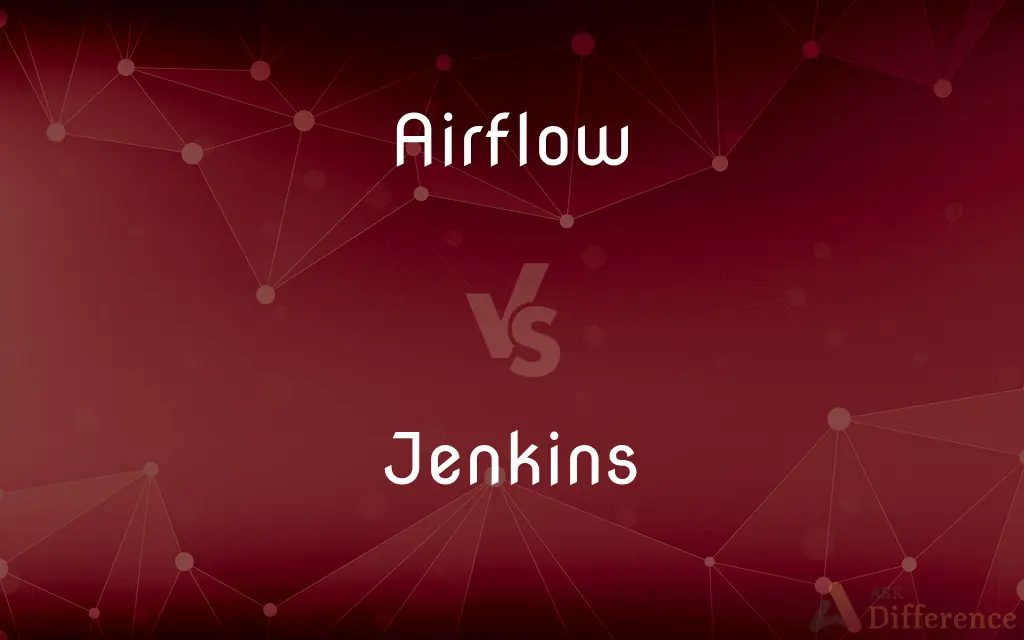Airflow vs. Jenkins — What's the Difference?
By Tayyaba Rehman — Published on January 3, 2024
Airflow is a platform for programmatically authoring, scheduling, and monitoring workflows, while Jenkins is an automation server for continuous integration and deployment.

Difference Between Airflow and Jenkins
Table of Contents
ADVERTISEMENT
Key Differences
Airflow is a workflow management system designed for scheduling and monitoring complex workflows. Jenkins is primarily an automation server used for continuous integration and continuous delivery (CI/CD) in software development.
Airflow uses Directed Acyclic Graphs (DAGs) to manage workflow orchestration and dependency management. Jenkins, on the other hand, uses pipelines to automate the building, testing, and deployment of software.
Airflow is well-suited for handling data processing pipelines, especially in big data scenarios, providing flexibility in data transformation and aggregation tasks. Jenkins excels in software development processes, particularly in automating various stages of a software delivery process.
In Airflow, tasks are defined in Python, which allows for complex logic and integration with other Python-based tools. Jenkins is more focused on plug-and-play operations with a wide range of plugins for various development tools and platforms.
Airflow offers dynamic pipeline generation and can handle complex dependencies, making it ideal for tasks that require advanced scheduling and execution order. Jenkins is optimized for straightforward workflows in software build and deployment with a focus on speed and efficiency.
ADVERTISEMENT
Comparison Chart
Primary Use
Workflow management for data processing tasks.
Automation server for CI/CD in software development.
Workflow Configuration
Directed Acyclic Graphs (DAGs).
Pipelines.
Best Suited For
Complex data workflows, big data environments.
Software build, test, and deployment processes.
Task Definition
Defined in Python, allowing complex logic.
Uses plugins for various development operations.
Handling Dependencies
Manages complex dependencies.
Optimized for simpler, sequential workflows.
Compare with Definitions
Airflow
Airflow is a platform for workflow management and scheduling.
We use Airflow to schedule our daily data processing jobs.
Jenkins
It is widely used in software development for continuous integration.
Jenkins has become an integral part of our continuous integration pipeline.
Airflow
Airflow is popular in data engineering for handling big data tasks.
We utilize Airflow extensively in our big data projects for efficient workflow management.
Jenkins
Jenkins supports various plugins for integration with development tools.
We integrated Jenkins with GitHub and Docker using its vast plugin ecosystem.
Airflow
It provides flexibility in designing complex data workflows.
Airflow's flexibility allows us to easily adjust our data workflow as requirements change.
Jenkins
Jenkins excels in managing straightforward software development workflows.
Jenkins efficiently handles our build pipelines, making the development process smoother.
Airflow
It allows defining, scheduling, and monitoring workflows programmatically.
Airflow helped us automate and monitor our ETL pipeline efficiently.
Jenkins
It automates the building, testing, and deployment of software.
With Jenkins, we have streamlined our software testing and deployment workflows.
Airflow
Airflow uses Directed Acyclic Graphs to manage task dependencies.
In Airflow, we set up a DAG to manage dependencies in our data processing tasks.
Jenkins
Jenkins is an open-source automation server for CI/CD.
Jenkins automates our code deployment process, ensuring quick releases.
Airflow
A flow of air, especially the motion of air currents around an object such as an airplane as it moves through the air.
Jenkins
A name of contempt for a flatterer of persons high in social or official life; as, the Jenkins employed by a newspaper.
Airflow
Any flow of air, especially the motion of air around a moving aircraft or aerofoil.
Airflow
The flow of air.
Airflow
The flow of air;
She adjusted the fan so that the airflow was directed right at her
Common Curiosities
How does Airflow handle task dependencies?
Airflow manages task dependencies using Directed Acyclic Graphs (DAGs).
Can Airflow be used for software deployment?
While possible, Airflow is not typically used for software deployment; it's better suited for data workflows.
What is Jenkins primarily used for?
Jenkins is primarily used for automating continuous integration and continuous delivery in software development.
What makes Jenkins popular in software development?
Jenkins is popular for its robust plugin ecosystem and ease of automating various stages of software development.
Can Airflow integrate with other data tools?
Yes, Airflow can integrate with various data tools and services, enhancing its capabilities in data processing.
Can Jenkins be scaled for large projects?
Yes, Jenkins can be scaled to handle large projects with multiple build jobs and parallel executions.
What is Apache Airflow used for?
Apache Airflow is used for scheduling, orchestrating, and monitoring complex data processing workflows.
What kind of scripts can Airflow run?
Airflow can run Python scripts and can be extended to run other types of scripts through its operator framework.
Is Jenkins suitable for data processing tasks?
Jenkins can be used for data processing, but it's primarily designed for CI/CD in software development.
What are the limitations of Airflow?
Airflow's limitations include handling real-time processing and a learning curve in setting up complex DAGs.
Can Jenkins handle complex, non-linear workflows?
Jenkins is better suited for linear workflows, though plugins can help manage more complex scenarios.
Is Jenkins easy to set up and use?
Jenkins can be straightforward to set up, especially with its extensive documentation and community support.
Are Airflow and Jenkins competitors?
They are not direct competitors, as they serve different purposes in the workflow automation and CI/CD space.
Does Jenkins support pipeline as code?
Yes, Jenkins supports defining pipelines as code, which allows for versioning and easy changes to the build process.
How does Airflow’s scheduling work?
Airflow schedules tasks based on a defined start time, frequency, and dependency rules in the DAG.
Share Your Discovery

Previous Comparison
Thermoplastic vs. Thermosetting Plastics
Next Comparison
HRM vs. Personnel ManagementAuthor Spotlight
Written by
Tayyaba RehmanTayyaba Rehman is a distinguished writer, currently serving as a primary contributor to askdifference.com. As a researcher in semantics and etymology, Tayyaba's passion for the complexity of languages and their distinctions has found a perfect home on the platform. Tayyaba delves into the intricacies of language, distinguishing between commonly confused words and phrases, thereby providing clarity for readers worldwide.














































